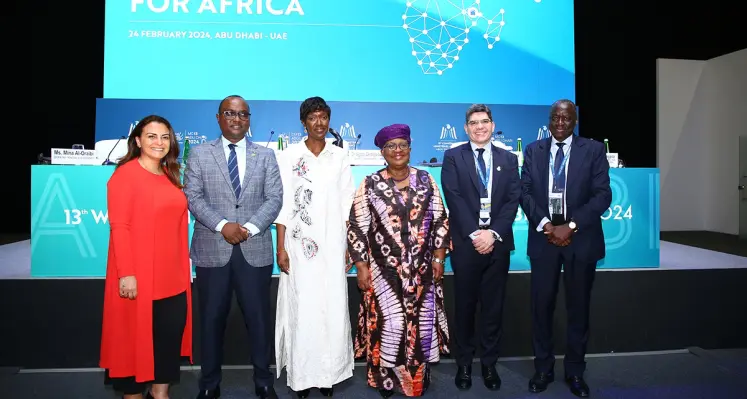In a collaborative effort, the WTO and World Bank has introduced the "Digital Trade for Africa" project to enhance Africa's role in digital trade
Digital trade presents significant opportunities for economies to boost growth, create jobs and reduce poverty, but more needs to be done to help African economies harness these benefits
This is the objective of a new WTO-World Bank project presented by the WTO director-general, Dr Ngozi Okonjo-Iweala, World Bank vice-presidents Pablo Saavedra and Ousmane Diagana and the Trade ministers of Benin and Rwanda, Shadiya Alimatou Assouman and Jean Chrysostome Ngabitsinze, at an event in Abu Dhabi on the eve of the 13th Ministerial Conference on 24 February.
In her opening remarks, DG Okonjo-Iweala said, “The future of trade is digital and green - and it should be inclusive. Digital trade is one of the fastest growing segments of trade in the world today. Young people and women on the African continent have shown that they are able to take advantage of these opportunities. Africa has only 1 per cent share of digitally delivered services trade, but I see it as an opportunity for the continent to grab on."
The World Bank's vice-president for equitable growth, finance and institutions global practice, Pablo Saavedra, remarked, "The global economy is experiencing again in 2024 probably a third year of deceleration in growth and that has implications for trade, investment etc. But the growth of digitally delivered service is a glimmer of hope, a bright light. The question is how to make this a tool for inclusive growth [in Africa]. This requires many ingredients that we need to put together for this to work. The first one is connectivity infrastructure."
The World Bank's regional vice-president for Western and Central Africa, Ousmane Diagana, said, "Digital trade needs assessments conducted over several months in Côte d'Ivoire, Ghana and Benin for West Africa, and Rwanda and Kenya for Eastern Africa have provided valuable insights into this age of digital trade and the specific challenges faced by different stakeholders, especially those in the private sector. … We have identified digital as one of the global challenges for the World Bank and an area that we definitely will engage in even further. Over the period 2019 to 2023, the World Bank delivered 72 digitalisation projects for a total amount of US$9bn in 37 African countries."
Minister Ngabitsinze said, "President Paul Kagame is a champion of "Smart Africa". In the last 30 years, we have tried to put in place policies, strategies and tools to connect Rwanda to the digital world – putting money and efforts into being in touch with the rest of the world. … The motivation behind this is to make sure that we do not continue to suffer from shocks, but have solutions to innovate around them. Rwanda is ready to support other such initiatives so that not only Africa, but the world, can trade through digital channels."
The project — entitled “Digital Trade for Africa” — seeks to help African countries share fully in the benefits that digital trade brings and improve their development prospects. It builds on a joint World Bank-WTO policy note presented to African officials in July 2023. Entitled "Turning Digital Trade into a Catalyst for African Development", the note calls for the creation of an enabling regulatory environment for digital trade. It can be accessed here.
Following interest expressed by nine African countries (Benin, Burkina Faso, Côte d'Ivoire, Ghana, Kenya, Mauritius, Nigeria, Rwanda and Togo), the WTO and the World Bank have already carried out pilot "Digital Trade Needs Assessments" in Benin, Côte d'Ivoire, Ghana, Kenya and Rwanda to determine possible policy action on digital trade for each country. Similar projects are foreseen in other African countries upon request.
Among the key drivers of the joint project is the need to ensure that digital infrastructure, such as physical connectivity and electronic payment systems, is complemented by a comprehensive regulatory framework.






















